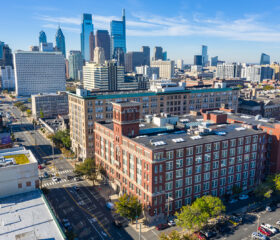By: Joey Garrand
2 min read January 2021 — Due to the desire to maintain the city’s architecture and culture, Philadelphia is no stranger to adaptive reuse projects. According to a study by RENTCafé, Philadelphia is ranked second among cities nationwide for most repurposed apartment buildings. With malls being forgotten, office buildings suffering and restaurants starved of customers, the landscape for adaptive reuse appears to be broadening.
Pre-pandemic, the struggles malls were experiencing in the face of a booming e-commerce industry was already well-known, but the pandemic accelerated their decline. Pennsylvania Real Estate Investment Trust (PREIT), owner of Fashion District Philadelphia and other malls in the region, filed for Chapter 11 on Nov. 1, 2020. On Dec. 11, PREIT announced it had emerged from Chapter 11 with $130 million of capital to support its operations and continue advancing its strategic priorities. Going forward, Joseph Coradino, CEO of PREIT, plans to repurpose its retail as necessary. “PREIT has a history of being a first-mover in adapting to new trends in retail and will continue to stay ahead of the emerging concepts and uses across our portfolio.”
In an interview with Invest: Philadelphia, Jim Riviello, principal and partner of The Martin Architectural Group, said that while he didn’t believe physical retail was dead, the sector does need to offer more. “Obviously, retail is struggling right now. I do not believe that online shopping will be the end of brick and mortar stores. What is needed is to provide a great user experience for shoppers. We have been active for 20 years with the redesign of struggling malls into lifestyle centers to include restaurants, apartments, medical offices, entertainment, and public activity spaces. These redevelopments provide a unique opportunity to introduce outdoor areas for seating with passive recreation, dynamic outdoor dining areas for restaurants, and healthy lifestyle activities, with walking trails and dog parks. I believe this trend will only get stronger.”
As the pandemic emerged in early 2020, office space and restaurants were among those taking the biggest hit. According to Newmark, a net total of 685,514 square feet of office space in Philadelphia was left behind by previous tenants in 4Q20, which is the largest quarterly loss since 2009. The vacancy rate for office space in Philadelphia stands at 15.1%, according to Newmark’s Q4 report. The landscape for the city’s restaurants has not been any better, with many closures, either temporarily or permanently, as a result of the pandemic.
Scott Zuckerman, Principal of Domus Construction, shared his insights in an interview with Invest: Philadelphia concerning the need to repurpose these struggling spaces. “I think what we are going to see is a lot of repurposing. ‘Repurposing’ is going to be a big buzzword in the real estate industry. I believe office space and restaurants in Philadelphia are going to take a hit. A lot of companies are going to realize that the workstation concept does not work with social distancing, and in many instances their employees can work efficiently at home, reducing their square footage needs. I don’t know how those spaces will be repurposed but the office model that people followed 15 -20 years ago, where everyone comes into the office every day, is going to go away.”
While the stock market soars and certain areas of the economy bloom, parts of Philadelphia are going under. Malls, office spaces and restaurants are all fitting targets for repurposing to better fit the modern needs of the emerging new normal.

